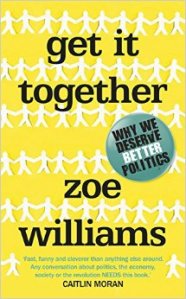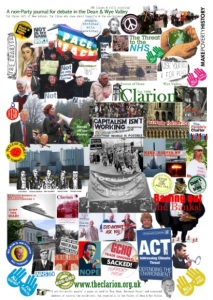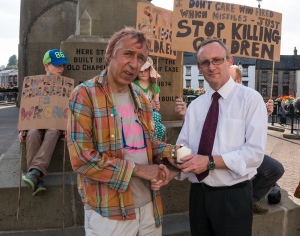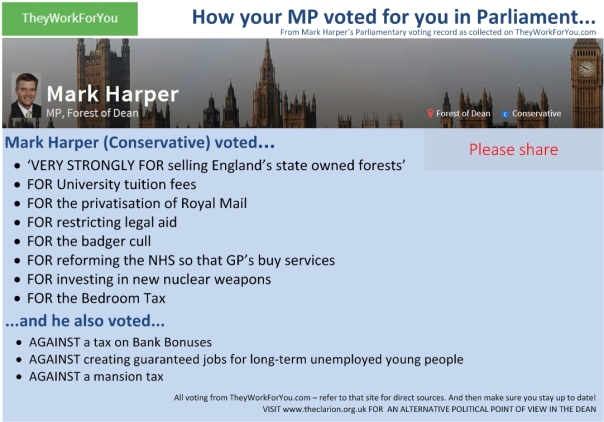An on-line Clarion special for the General Election 2015 by Monmouth Labour’s Tyler Chinnick, in between canvassing for Ruth Jones in Monmouth.
On Shamocracy yesterday Brogan Morris took exception to the main parties urging the electorate to vote tactically. I understand amidst the noise and blackmail it can be easy just to think ‘Fuck it’ and vote for the party that most closely represents your own views, but that would be a mistake. Let me explain why.
I came of political age under New Labour and to a large extent I defined myself in opposition to it; to its policies of war and privatisation, of ID cards and 90 day detention. I loathed its rightward lurch and felt absolutely no affiliation to it.
As my political education continued my opposition to New Labour quickly became indistinguishable from my opposition to neo-liberalism and American imperialism. During this time I flirted with a number of groups – TUSC, the Socialist Party, the Socialist Labour Party, the Socialist Party of Great Britain, the Socialist Workers Party, the Communist Party of Britain, the People’s Front of Judea… the Judean people’s front…
Prior to the last election I organized a hustings to which our then Labour candidate was invited alongside Plaid, Green, Communists and others. When confronted with a semi-hostile left-wing audience* the Labour candidate’s default argument as to why we should vote Labour was ‘to keep out the Tories’. This struck me as being horribly negative. I hated that they had nothing positive to offer and I resented the implied blackmail. And so at the last election, knowing that Labour were certain to lose and living in a safe conservative seat I felt no regret about casting my vote for the most left-wing party on the ballot – The Greens.
I presumed that even though my vote would make absolutely no practical difference Labour would at least register the discontent that I and many others felt.
In 2015, however, you absolutely should fear another Tory government and it isn’t illegitimate to point out that the only way to stop it is by voting Labour.
Nonetheless, I fully understand that that isn’t enough. People have the right to demand something to vote for; luckily in Ed Miliband’s Labour we have it.
When the financial crisis hit a few years previously I had naively assumed that everyone would more or less instinctively see the error of their ways and, with the exception of a few free-market fundamentalists declare neo-liberalism dead. The political parties could then begin in earnest to decide what would replace it. This would be remarkably propitious to the left in general and the Labour party in particular.
Skip forward to the Labour leadership election. On the BBC Parliament channel Ed Milliband is giving a speech to the Fabian society outlining his assessment of Labour and the country and his vision for our future. His basic contention is essentially this: like the post-war consensus before it the Thatcherite consensus is now dead, Labour has alienated many of its core supporters, shed thousands of members and been reduced to its second worst election result since 1918. It is time to reconnect and forge a new path. I’m sold and although not a member I’m rooting for him.
A battle between left and right ensues. That his brother, an unreconstructed Blairite should embody the other pole of Labour opinion and also be Ed’s main rival gives the contest the feel of a Shakespearean tragedy. What’s left of the New Labour machine is mobilised for David and the media have more or less crowned him winner before the battle proper has even begun. So as well as having the right prescription Ed is also the anti-Blairite candidate – suddenly I feel that it is even more important that he should win.
A year later Ed Milliband gives his first speech as leader at the Labour conference. By anyone’s standard it’s not good. Propped on the lectern is a voluminous manuscript from which he reads like a particularly uncharismatic politics professor. The content is very similar to the speech given to the Fabians that so impressed me a year earlier, but overly academic and lacking the common touch it fails to connect with the audience. The verdict from the commentariat is damning. The right wing press wrongly interpret his attempt at left-wing populism as a return to 1970‘s style ‘old Labour’. That he lacks the rhetorical skills of a Thatcher or Blair is evident but the content for me is more important.
The calls of having chosen the wrong brother intensify and treacherous Blairites crawl out of the woodwork to sniff and sneer; people begin to talk about getting rid of him “before it’s too late”.
In fact the reaction becomes so hysterical, so over-the-top, so nasty and personal that I decide to join the party in the hope of bolstering his leadership credentials in whatever small way I can.
Miliband’s time as leader since has been characterised by challenging conventional wisdom and taking on powerful vested interests, and winning.
He has broken the neo-liberal consensus by championing market interventionism, opposing privatisation and proposing some re-nationalisation, albeit limited.
He defied both Rupert Murdoch and conventional wisdom when Murdoch tried to take over the remaining shares of bskyb. He followed it up by vowing to implement Lord Leveson’s findings in full, which would, amongst other things break up Murdoch’s press monopoly. It’s no wonder the ‘dirty digger’ harangued his journalists a few weeks ago for not doing enough to harm Miliband. The sound of the gutter press in full attack mode combined with Lynton Crosby’s shameless smear campaign (it seems British politics is now overrun with venomous antipodean reptiles) should be enough to elicit your sympathy for Mr. Miliband if nothing else. The fact that he has faced all this with a commendable humility and resilience should – if people really do want politicians of principle and decency – consider awarding him their vote on Election Day.
Consider this also – if Ed Miliband becomes prime minister tomorrow it will mean the end of the toxic stranglehold that an unaccountable foreign national has held over our politics since the 70’s. The British press and British democracy will be infinitely healthier as a result.
By voting for the recognition of a Palestinian state and refusing to support the bombing of Syria he defied the assumption that Britain will always support the U.S. But this still won’t be enough for some people. He doesn’t want to scrap Trident and has no aim of disbanding the army like the Greens. But if he does become Prime Minister we will see the most significant shift in British foreign policy since at least the 1970’s.
I probably don’t need to remind readers of Shamocracy of the legacy of this government but quickly: 700,000 people on zero hours contracts, at least a Million people forced to rely on food banks, the worst rate or underemployment in the E.U, 3.5 million children living in poverty, the bedroom tax, a huge onslaught on welfare which has led to people dying, large scale privatisation of the N.H.S, privatisation of the Royal Mail and probation services, rising energy prices, a cost of living crisis, disability hate crime up, homelessness up. We have the ability to end all this tomorrow. But only if we vote Labour.
If elected Miliband will end the bedroom tax, ban zero hours contracts, take action on food banks, reverse the Health and Social Care Act, start a million new house builds, raise the minimum wage, take action on energy prices, ensure a fair deal for private renters, introduce a mansion tax, hire 20,000 more nurses, end the free school program and the list goes on.
The Labour party supports TTIP. I do not. I share the Green position. But this is one issue out of many and I would much, much rather spend my energies fighting a Labour government on that one single issue than a Conservative government on everything.
Even then, Labour has pledged to ring-fence our most valuable public service – the NHS – from TTIP.
So, since on more or less everything else the Greens and Labour are in agreement – the only question is the extent. Greens want a minimum wage of £10 by 2020; Labour £8. Greens want to bring the railways back into public ownership by waiting for the contracts to expire; Labour want to set up a state rail company to bid for contracts and gradually bring the railways into public ownership that way. The Greens want to raise the top tax band to 60p; Labour want 50p. The Greens want a complete end to privatisation in the NHS; Labour want to reverse Tory privatisation and cap profits on contracts already awarded.
The main difference between Labour and the Greens is that the Greens don’t have to worry about either large-scale electability or whether their ideas are practical. Labour on the other hand doesn’t have the luxury of being a minor party; they can’t throw out ideas and see what sticks. If they commit to something chances are they’ll have to implement it.
Throughout the dark days of New Labour I encountered various hard-left groups, such as those mentioned earlier who insisted that Labour weren’t left-wing enough. But I recognised that their prescriptions – basically an unreconstructed Socialism – were completely unelectable. There was surely a path to be trodden between ‘New Labour’ and out and out Socialism (however desirable that may be) that was both properly left wing and electable. At last in Ed Milliband’s Labour we have such a party.
Meanwhile we now have more insurgent groups who are not only insisting that Labour isn’t left enough but are taking Labour votes. How tragic would it be that given the opportunity to vote for change – real change unlike we’ve had in years – a section of the left should deny us that opportunity by voting for the Green or SNP?
Brogan regards the first past the post voting system as “absurd” but burying your head in the sand and voting as if we have a proportional system is even more absurd.
I’m not saying under no circumstance don’t vote Green, far from it. If you live in Brighton or a super safe seat then by all means obey your conscience. But if you live in a Labour-Tory marginal please vote with your head not your heart, and put your cross in the red box.
Don’t #Votegreenandfeelblue #VoteLabour
*it was at this meeting that the Green party leader in Wales Pippa Bartolotti claims to have got her political awakening





